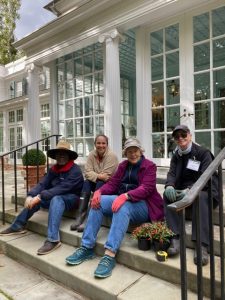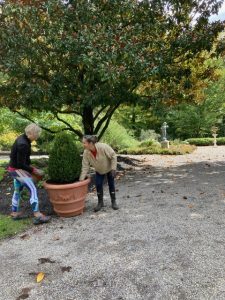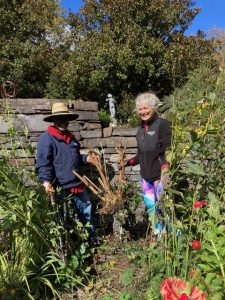Ever since Barbara Bromley consulted at Drumthwacket in 2005, MG volunteers expanded an initial role of creating the Master Gardener Grotto Garden to one encompassing responsibility for all the beds, borders and ornamental urns. Utilizing their MG training and research skills, they weed, plant annual borders and seasonal bulbs, prune and shape shrubs, and evaluate plantings in response to climate change, disease and insect pests, and environmental conditions.
In 2020, the Drumthwacket Foundation enlisted the Rutgers Center for Urban Environmental Sustainability (CUES) to develop a master plan to restore the property’s Italianate design while including native plants, wildflowers, and grasses to create green infrastructure and strengthen climate resiliency. MGs work with CUES co-director Wolfram Hoefer and student interns to evaluate and revise the plan. Recent activities include installation of two rain gardens to address runoff, removal of invasives from shrub borders, and planning for a compost site that will recycle green waste and serve as an educational model for the community.
MGs also serve as docents. For general visitors, they explain the history of the property as well as the goals and accomplishments of the master plan in restoring the garden. As part of the “Discover Drumthwacket Program,” which welcomes hundreds of children from New Jersey schools to tour Drumthwacket, MGs present the highlight of the day – a visit to the Frog Pond. The children, captivated by the frogs, their sounds, and their hopping, learn from MGs about the life cycle of the frogs and the role they and the pond play in the garden.
 |
 |
 |
